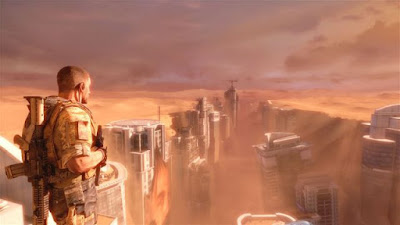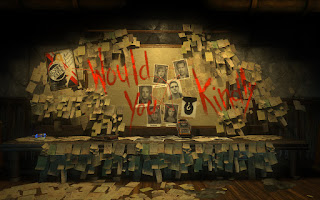Looking Back at the Mass Effect trilogy - Part One
The Mass Effect trilogy is undoubtably one of the most important series in modern gaming, as well as being acclaimed developer Bioware's defining work. The trilogy reached universal acclaim for it's unprecedented approach to interactive storytelling. Having meaningful player choices effect the story in a game was nothing new by 2007's first Mass Effect, this was a gameplay mechanic Bioware actually pioneered with their early console RPGs; giving players big and small decisions that in some way had consequences effecting the overall experience. What made Mass Effect unique was that these decisions would have consequences following you for the next three games. It was a massive undertaking and not a concept that even Bioware have tried to tackle since 2012's Mass Effect 3 wrapped up their trilogy. So after coming across a disc of one of my personal favourite games, Mass Effect 2, this led me to wonder how successful Bioware's space opera was. Was the Mass Effect trilogy amazing because it was unprecedented, or do they still hold up? This led me to a lengthy replay of the entire trilogy over the last few months to find an answer to this question. This is a game-by-game look back at Bioware's magnum opus.
Mass Effect (2007)
What’s so remarkable about Mass Effect from the get-go is its deep, realistic world building. Everything from ME’s futuristic technology, lore and even the main playable character’s special abilities aren’t just explained away through ‘space magic’ like many other sci-fi video game series. They’re all grounded in realism. However, the most extraordinary part about Mass Effect’s world is its in-game politics. Each race has their own traditions, culture and different relations with other species. What adds emotional weight to the entire trilogy is how Mass Effect so closely ties the bigger galactic conflicts with the NPCs in your crew.
Your crew in the first game is comprised of six characters, human and alien, and talking to them between missions reveals more about ME’s world. For example, Tali, a quarian, dishes out about how her people created a robotic race called the geth and essentially attempted genocide when they began to show signs of consciousness. The following civil war led to her people being exiled off of their own home world and spending centuries on a large fleet. This isn’t just background detail about the game world; the geth are a major antagonistic force in the first Mass Effect, meaning Tali’s story isn’t just context for the plot, it adds personal stakes to the storyline and this method of humanizing the story is repeated with almost every crew member. It’s what makes Mass Effect’s story so endearing, there’s not only plot implications for every story beat, the stakes are personal.
With all of Mass Effect’s accomplishments, its plot is slightly less groundbreaking. The galaxy is under threat of extinction from an ancient evil, the Reapers, and it’s up to Commander Shepard to prove their existence to the Council and the rest of the galaxy. It’s fairly traditional but again, it’s Mass Effect’s world and character’s that elevate the story into something more.
With humanity being the relative newcomers to galactic politics (only having discovered other races’ existence 30 years ago) their credibility is dampened, with only three humans being eyewitnesses to the Reapers’ existence. This adds some fun tension to Shepard’s encounters with the Council as you navigate the tricky politics of Mass Effect’s world. The revelation that the Reapers come to the galaxy to kill all life every 50,000 years also adds some much needed urgency to the story for the next two sequels.
Despite Mass Effect’s stellar story, it’s not flawless. In fact, the first thing that stood out to me while replaying the 2007 classic was its age. Graphically, this was nothing surprising; even in 2007 Mass Effect never had a reputation as the best looking game on the market. It’s really Mass Effect’s combat that time hasn’t been kind to.
Guns feel unresponsive and dissatisfying since you can’t clearly see bullets coming out of Shepard’s guns, combined with the awkward aiming and it’s mostly tough to tell if you’ve even hit a target. Weapons also sound and feel pretty lifeless, making ME’s combat dry with the only signs of character and uniqueness come from some cool special abilities you and party member acquire.
Skill progression is fine with skill points being allocated to upgrade abilities, passive and active; the only real downside being that certain dialogue options are tied to how many points you’ve put into the charm and intimidate abilities, which is at odds with Mass Effects interactive approach to storytelling of giving you as much choice as possible. In contrast to Mass Effect’s easy to use and simple skill progression, weapon customisation is a major hassle. Every few minutes it felt as if I had stumbled across a better set of weapons and grenades dragging me through hard to navigate menus if I wanted the best gear equipped.
The on foot combat sections aren’t Mass Effect’s only problems. The game also includes some vehicular combat with a space buggy called the MAKO that occasionally shows up. These could’ve been nice changes of pace but annoying physics and controls in addition to the same issues with unresponsive gunplay make the MAKO sections just as sluggish as the on foot sections.
These problems might not have been as frustrating if it wasn’t for Mass Effect’s punishing checkpoints and bugs. The first time I died while replaying the game I stared at the loading screen expecting to lose 10 or so minutes of progress, maximum, only to find I had been taken back 30 minutes to the very start of the mission. This too wouldn’t have been a major issue if Mass Effect allowed you to save during missions, but that feature is glaringly absent. The next time this became a noticeable problem was during a boss fight: Shepard became inexplicably stuck on a flight of stairs forcing me to load to the latest checkpoint – 40 minutes prior. Mass Effect’s inconsiderate checkpoints make the game borderline unplayable in sections with difficulty spikes where you might die a few times. After turning the difficulty down to easy I completed the last half of the game in just 3-4 hours with no deaths, and honestly resented Mass Effect’s combat segments a lot less.
Mass Effect’s combat might have aged poorly, but that doesn’t mean every aspect of its gameplay has. What make Bioware games so unique are their impactful choice/consequence decisions, and they’re here in full force. Big or small, the minute-to-minute decisions you make during conversations are really where the fun’s at in Mass Effect. The most satisfying conversations are the ones you have with Mass Effect’s various and well-written crew members. Characters that struggle to deal with disgraced family names, deaths of friends and a biological weapon creating a threat of extinction for their entire race. The secondary characters are all deep, interesting and always shed new light on the world of Mass Effect. The best part is that these conversations are all optional; they feel like an earned relationship after checking up on your crew members between missions, making them that so much more rewarding.
Mass Effect’s decisions go further than learning more about a few characters though. Some of these decisions have far larger implications, one of the standouts being a decision on whether to let a Rachni queen free or doom her and her people to extinction based on their race’s violent history. Even though decisions like that don’t have major consequences for the rest of the first game, they test the player’s ethical standards enough that each big decision is meaningful to you.
In truth the first Mass Effect’s reputation as an all time great is exaggerated. While its story and world building can’t be overstated, poor age has rendered Mass Effect’s gameplay into dry shootouts through even drier corridors connecting magnificent moments with great characters and decisions. At least its legacy as the start of something incredible is untouched: if Mass Effect does anything perfectly, it’s laying the groundwork for a monumental trilogy.











Comments
Post a Comment